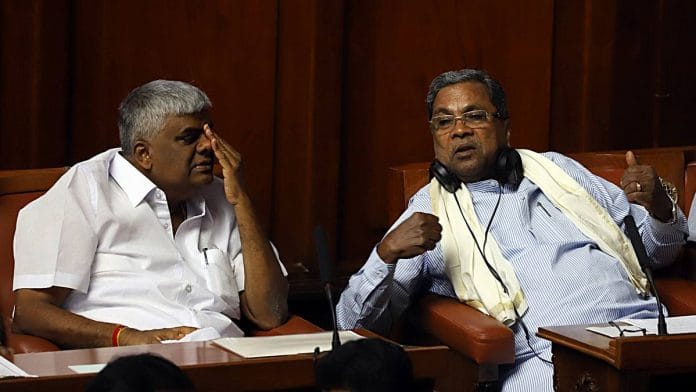Deve Gowda’s son and his superstitions
Karnataka minister H.D. Revanna is obsessed with superstition, and he is probably hoping his beliefs will help save the Congress-JD(S) government led by his younger brother H.D. Kumaraswamy, which is teetering on the edge of collapse following a series of resignations.
After offering a puja at the famous Chamundeshwari temple in Mysuru, where he also met BJP MLA C.T. Ravi, Revanna landed at the Karnataka assembly barefoot as the monsoon session began Friday.
He has exhibited his devotion to superstitions earlier as well. When he was made PWD minister last year, he travelled 350 km from his home at Hassan to Bengaluru daily, for close to a month, because his government-allotted residence was not Vastu-compliant.
Revanna, the elder son of former PM H.D. Deve Gowda, is usually seen carrying a lemon in his hand to ward off the evil eye, and at a meeting of his party, the JD(S), in March this year, he distributed lemons among the attendees.
It was not long before that a vegetable vendor in Mandya decided to brand his lemons by the minister’s name, and they sold like hotcakes. In a viral video, the vendor was heard calling customers,“Come, come, five lemons for Rs 10, Revanna lemons for Rs 10!”
Also read: Dissent brews in Goa BJP as rape accused Monserrate & ‘Matka King’ Kavlekar join party
Asked for post-demonetisation data from job exchanges, Modi govt throws up its hands
At a time when job creation for India’s youth is a major challenge facing the Narendra Modi government, the Ministry of Labour and Employment does not have nationwide data on the number of job-seekers registered in employment exchanges for the years after demonetisation (after 2016), if one goes by its response to a Parliament question.
When Lok Sabha MPs Nishikant Dubey and Ajay Kumar Mandal sought to know the number of educated, uneducated, rural and urban youth registered with the exchanges for each of the last three years and 2019, the ministry only provided data for 2016 and the two years preceding it.
As of 2016, there were 59.6 lakh people registered with employment exchanges around the country, Santosh Kumar Gangwar said in reply to the query. This number was lower than the 69.39 lakh reported in 2015, according to the ministry’s data.
A labour ministry official who did not wish to be identified said data on employment exchanges is collated by states and not the Centre. The lag in data, the official added, was a result of states either not gathering the information or not sharing it with the Centre.
Employment exchange data for 2017 is unlikely to present a favourable picture about the performance of the Modi government. The ban on two high-value denominations in November 2016 sharply increased the number of unemployed people as many small-scale enterprises were forced to shut shop on account of the acute cash crunch that followed.
The unemployment numbers reflected by the periodic labour force survey for 2017-18 showed that the unemployment rate increased to a 45-year high of 6.1 per cent, with unemployment rates among the youth (15-29 years) touching 17 per cent.
The Modi government had withheld the release of this data before the elections and released it only after coming to power in May.
Employment exchange data until 2016 shows that Tamil Nadu (12 lakh), Maharashtra (6.3 lakh), Kerala (6.2 lakh), Uttar Pradesh (5.9 lakh) and Gujarat (4.46 lakh) had the highest number of people registered with the employment exchanges.
(Contributors: Remya Nair and Rohini Swamy)






